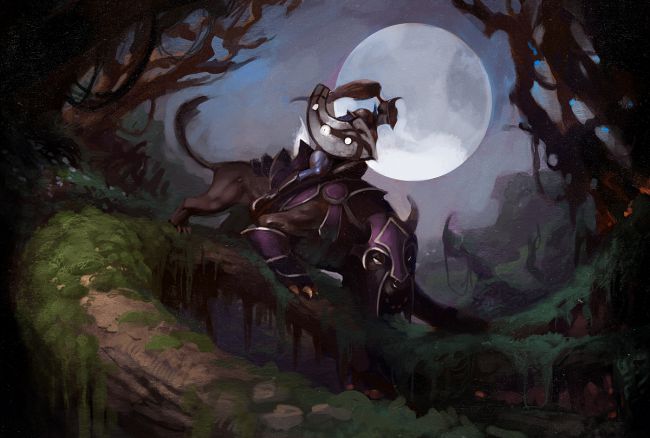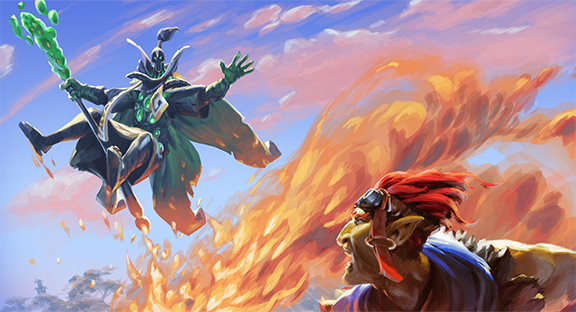What it really means to be an autistic Dota 2 player
"A little understanding and care makes our world a better place and makes us all better players."

At the risk of sounding like I'm in a support group: I am autistic and I play Dota 2. Unfortunately, from my experience, the Dota 2 community has a poor understanding of autism. I can't count the number of times I've seen 'autist' used as an insult. I recognise that there is always going to be an element of any online community that will refuse to change, but I'd like to take this opportunity to give a bit of information to the rational majority.
To put it in the most general terms, autism is a lifelong developmental disability. It affects how you experience the world and interact with it. Your senses can be over-sensitive, or under-sensitive, and social interaction can be challenging. Your brain is wired differently from most people, and also from other autistic people—nobody is autistic in the same way. Autistic people make up at least 1% of the population, so you will have probably met somebody with the condition. You have almost certainly played an online video game with an autistic person.
Indeed, anecdotally it seems that autism is rather well represented in online and tech communities. Computers are easier than people, more predictable. This is not to say that I don't desire social contact, but I find it difficult to navigate social situations with ease. I just need a little more time and solitude to recover from heavy socialising. Having an environment where communication is usually limited to the rules of a game is a release.
Having an environment where communication is usually limited to the rules of a game is a release.
It's hard for me to put my thoughts into words quickly. When playing Dota, I can recognise when a hero has moved out of position and that now is the time to gank, but organising my mouth to say “ATTACK NOW!” takes longer. I tend to communicate using the chat wheel, with pre-set phrases, and by pinging the map. I am thankful there is a system set up that allows me to talk to my team-mates without having to use voice chat.
I don't speak much even when playing with friends. I tend to interrupt them, as it's a struggle to tell when it's my turn in a conversation. I stammer and fumble trying to express myself, especially when I'm concentrating on something else—for example, last-hitting, or micro-managing units. However, I am perfectly capable of understanding what other people are saying, and I enjoy doing my best to be a team player.
Autism is not a learning disability, though some autistic people may also have one or more of those. Autism is commonly associated with dyslexia, dyscalculia and dyspraxia—that is, problems with reading, writing and movement. I am clumsy, and have accidentally attempted to teleport back to base in the middle of teamfights multiple times in the past. However, I don't have a learning disability myself—it's more like I have a deficiency in common sense.

It is incorrect to call an autistic person a 'retard', and the word 'autist' isn't used by anybody in real life. Even my spell-checker says that it's not a real word. Incidentally, and I know I'm not going to be the first to say this, but please don't call players 'retards'. I've met wonderful people with learning disabilities, and they don't deserve to be brought down to the level of those who choose to jungle Legion Commander.
The biggest gaming news, reviews and hardware deals
Keep up to date with the most important stories and the best deals, as picked by the PC Gamer team.
Being autistic does come with benefits, however. I can hyper-concentrate on a game when I am not interrupted. It's like the game becomes my world and I'm able to devote my entire attention to it. This is a common trade-off with autism: extreme-focus in exchange for multi-tasking.
I also have a rather good memory for trivia. This is important, as Dota and other competitive games tend to build up entire libraries of situational facts and unusual interactions. How is Sven's cleave affected by armour? Damage block still works, but the cleave damage is not reduced by how much armour you have. I admit, it's a fringe case, but we all know in the long run everything matters. I always try to learn more, so I'm not caught out. I don't know everything and I get facts wrong on occasion, but I have a drive to better my knowledge.
To my knowledge, autism has never been professionally diagnosed on account of a Twitch stream.
Based on what I've just said, you might be thinking “I know a pro-player who must be autistic!” Please, don't. Every autistic person is different, and autism is far more than a collection of tics and idiosyncrasies. The chances are good that you are not an expert in neurology, and seeing a player being awkward in an interview is not sufficient for you to diagnose them. You're just adding to a stereotypical perception of autism that you've seen on TV. This is a genuine disability that can profoundly affect your existence, and requires a qualified professional to examine essentially your entire life history with you and your family. To my knowledge, autism has never been professionally diagnosed on account of a Twitch stream.
I would not be surprised at all if there were prominent players or personalities who are autistic. Indeed, I'd love it if somebody went public and became a role model, but it would be their choice to do so. Discovering you are autistic can be intensely private, and I would not want to throw it around like a Pudge hook. Unless I knew somebody well personally, I would not attempt to talk about their potential autism, and I certainly would not do so in public.
It's too easy to be lazy in the language you use. Competitive gaming is fighting into the mainstream, so it's pointless to isolate and shrink our community with insults and ignorance. I'm not saying you have to like everyone, or like how everyone plays the game, but a little understanding and care makes our world a better place and makes us all better players. We can still have fun, and make jokes, and laugh—because no matter what, you suck if you jungle Legion Commander. Kappa.

